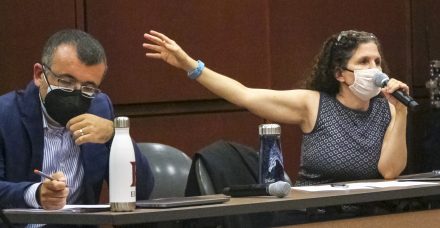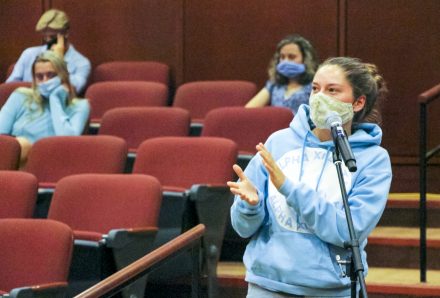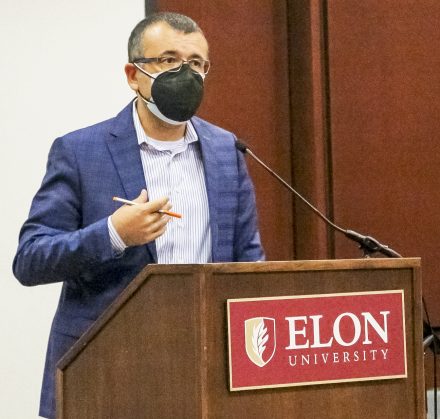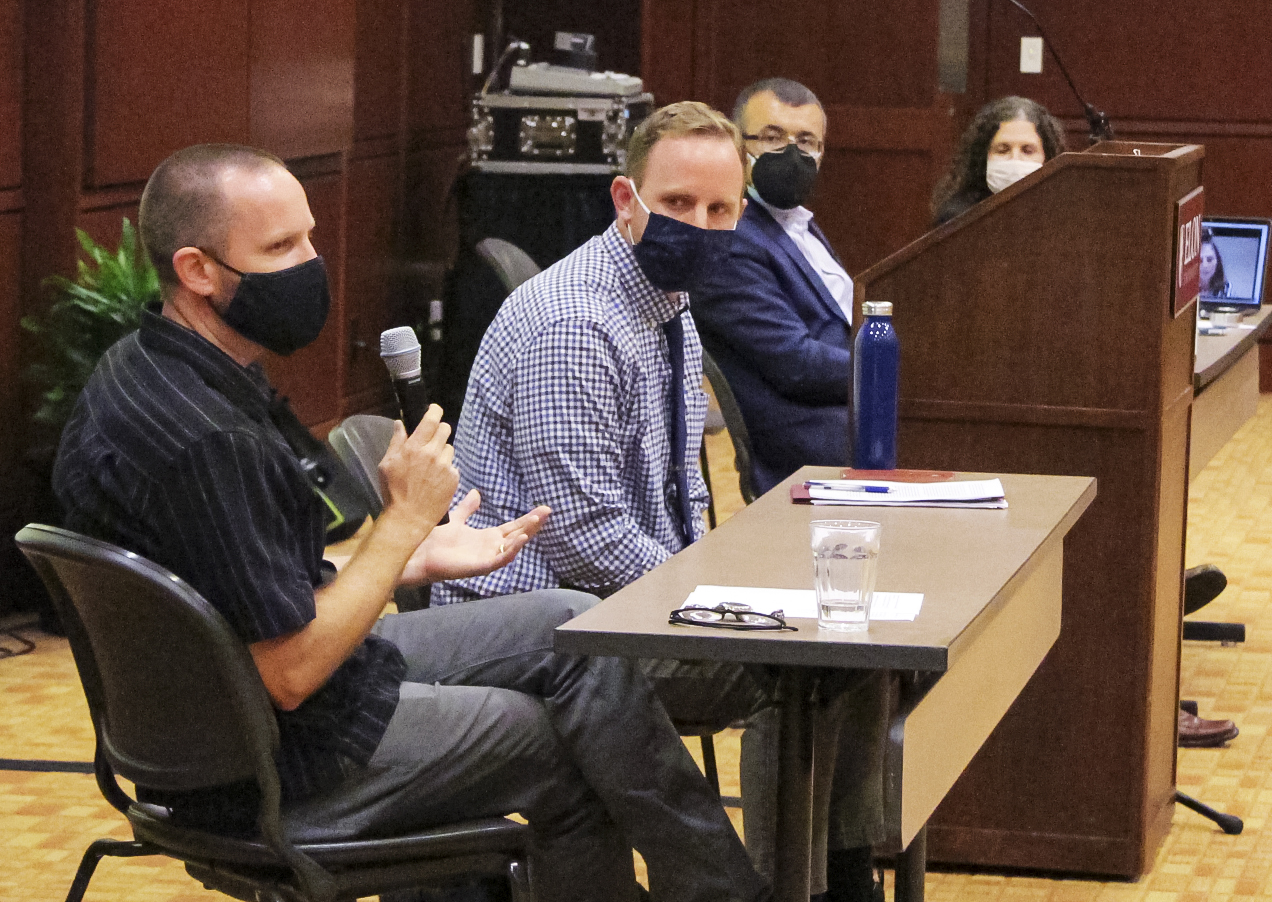The 20 years since the Sept. 11 attacks have seen shifts in politics, international relationships and culture, professors said in broad discussion of the aftermath
Beyond the tragedy of that moment — still fresh for any who lost loved ones or lived through it — the Sept. 11 attacks on the World Trade Center and Pentagon continue to shape America’s politics, foreign policy and culture in ways we’re just beginning to understand.
A panel discussion Thursday among faculty from the International and Global Studies program and the Department of Political Science and Policy Studies summarized some of those shifts and put them into context.
The attacks led to the wars in Afghanistan, Iraq and the broader “war on terror.” Abroad, those wars disrupted international relationships and destabilized the Middle East, leading arguably to more terrorism. The U.S. government increased surveillance of American and international communication and travel. Culturally, popular films lionized the U.S. military and downplayed negative impacts of war, mostly avoiding criticism of America’s response to the attacks, breakdowns in liberal democratic norms against torture and the loss of civilian lives. Grieving the 2,977 killed in the attacks, paying tribute to their mourning families, shifted into ways to stir patriotism and national feeling.
“The memory of Sept. 11 has been hijacked every day since” to support problematic policies, a war based on lies and the use of torture by the American military, said Assistant Professor of Geography Sandy Marshall. “All of us are still feeling the repercussions of that ‘war on terror.’”

Professor of Political Science Safia Swimelar organized the panel that included Marshall, Professor of Political Science Jason Kirk, Associate Professor of Political Science Baris Kesgin and Sarah Wagner, an anthropology professor at George Washington University. About 50 people attended the discussion in LaRose Digital Theater.
Each panelist spoke briefly about where they were when the attacks occurred and how the changed world affected their scholarship and careers in the years since.
Kesgin, who studies foreign policy analysis and the Middle East, said the ensuing wars led to the erosion of democratic norms and international institutions. For decades, the U.S. had worked to bolster the stability of the United Nations, but broke the peace in going to war with Iraq. He also related personal anecdotes of invasive security screenings during travel by Muslims or those with Islamic-sounding names.
Swimelar analyzed films and images stemming from Sept. 11 or wars in the Middle East. Her study of international relations and law includes the politics surrounding visual culture. Hollywood churned out a number of problematic films in the years afterward, she said. They portrayed war as noble, failed to address the real costs of war to individuals and societies and gave the false message that torture is effective in apprehending terrorists, Swimelar said.

She also showed several images from the mistreatment and torture of prisoners at Abu Ghraib. At the time the photos surfaced in the media, some featuring soldiers smiling, Americans seemed more concerned with the source of the photos than the actions contained within them, Swimelar said.
“So many norms have been eroded, specifically the norm of America being against torture,” she said. “There was no accountability in the US for those who broke the law through systematic torture and inhumane treatment. So that in 2016, a presidential candidate emerges who says we need more torture, not less.”
Marshall attempted to account the losses since Sept. 11: the casualties of that day, the over 7,000 servicemen and servicewomen killed and the tens of thousands more wounded, the 30,000 veterans who committed suicide after returning home and the thousands more who suffer PTSD. More than 8,000 U.S. contractors were killed in Iraq and Afghanistan, and it’s estimated that more than 300,000 civilians were killed there.
Marshall studies human migration and geography. There are more than 40 million refugees around the world, the highest number since World War II. The opportunity costs of the nearly $8 trillion spent on wars and defense since 2001 could have been used to bolster healthcare, education and infrastructure, he said.
After former President George W. Bush and his administration called for war with Iraq based on the lie that Iraq had weapons of mass destruction and was involved in Sept. 11, it exacerbated America’s distrust of the government and news media.

“The question that haunts me most is, ‘What if?’” Marshall said. “Before the dust had even settled from those buildings, we were beating the drums for war. What if we’d taken the Taliban’s offer to negotiate and bring Osama bin Laden to justice?”
Wagner spoke about the process of recovering and identifying more than 22,000 fragments of human remains at the crash sites — a process that continues through DNA analysis. Because of a piecemeal notification process, families received notice each time a fragment of their loved one’s remains were identified. The medical examiner who imposed that system in New York City eventually ended that practice when they realized it was harming families. Because of the massive amount of unaccounted for and unidentified remains, the World Trade Center site became a “memorial and a mausoleum,” housing those remains in a “mix of the sacred and profane as a monument to the loss of life … set in the commercial heart of New York City.”
Kirk, who moderated the discussion, mentioned his path through academia in the aftermath. He wonders whether his expertise in South Asian politics would have been desired by many universities if Sept. 11 hadn’t underscored the need for education about international policies.
“It affected us all personally and as scholars,” Kirk said. “Especially this time of year, I make a point of sitting with what happened. I’m still often at a loss for words to describe the emotions and loss, but I never feel more alive in my profession than when I sit with students and we try to make sense of it: the causes, the consequences. We’re still on that journey of making sense of it.”



